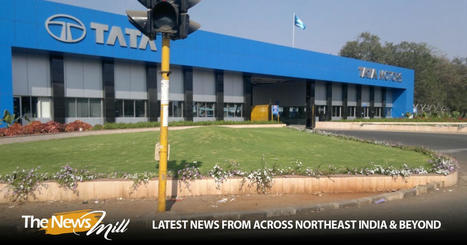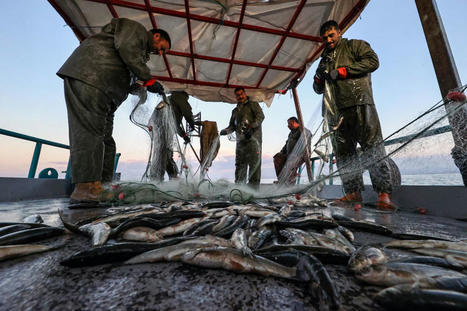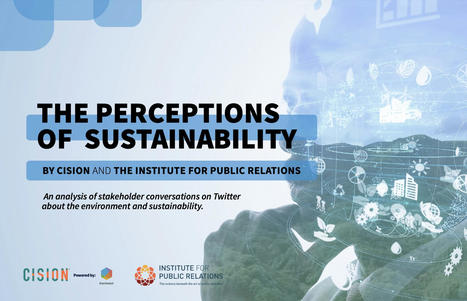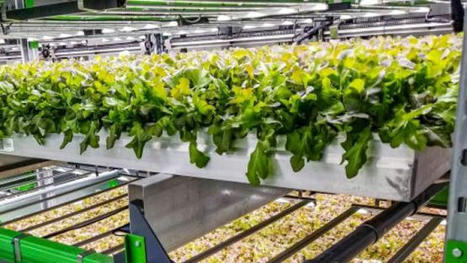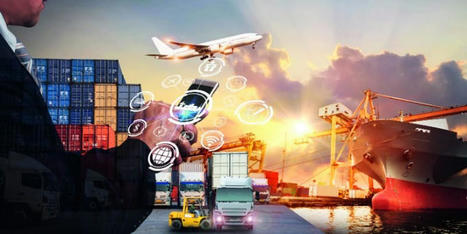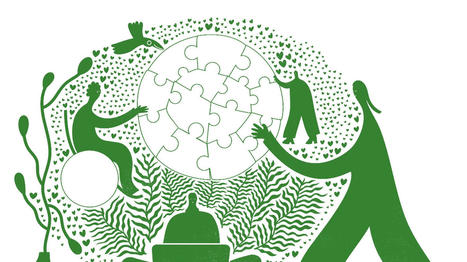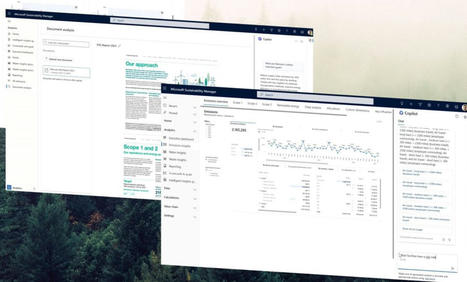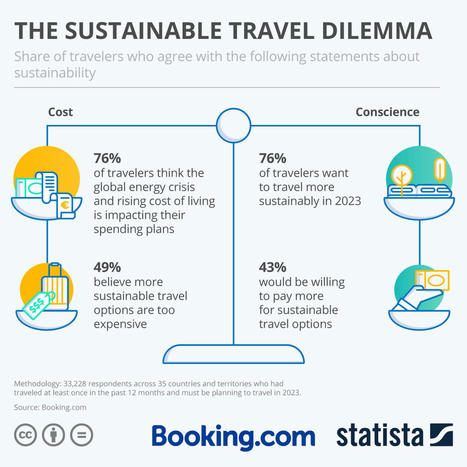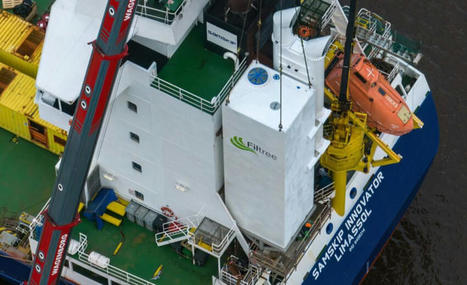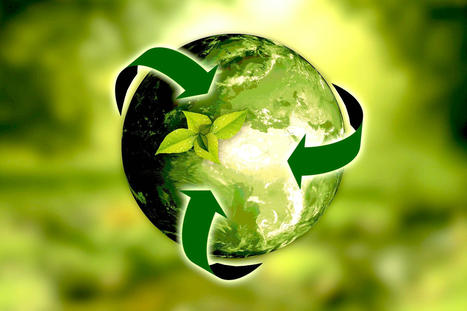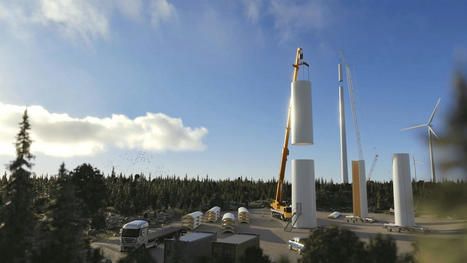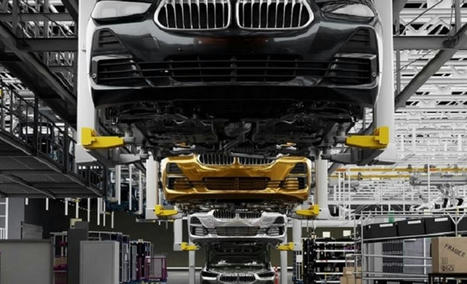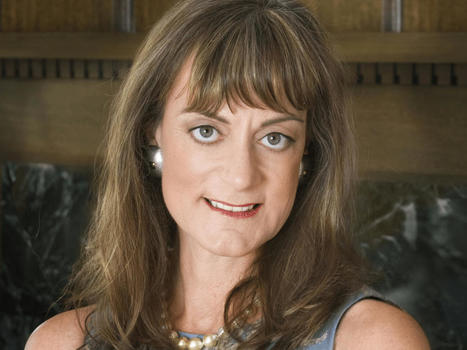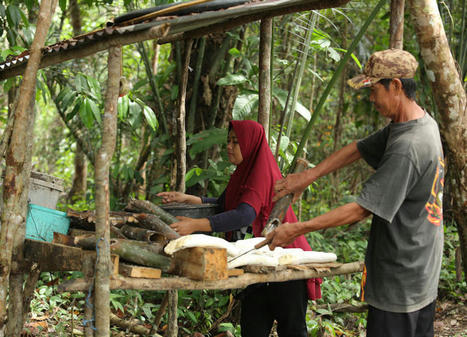 Your new post is loading...
 Your new post is loading...
Tata Motors, a leader in automotive innovation, recently presented its futuristic solutions for mobility at EXCON 2023, emphasising the need for sustainable commercial vehicles. With a focus on green technologies, Tata Motors has greatly boosted its investments in electric and hybrid vehicles.
Via EcoVadis
Sustainable packaging leaders Rootree and Tiny Box Company innovate in a challenging world. Learn how they minimize environmental impact and foster social responsibility through renewable materials and recyclable packaging.
Via EcoVadis
et-food giant Mars and agri-food heavyweight Cargill are backing a new scheme set up by the WWF, aimed at making fisheries more sustainable.
The World Wildlife Fund (WWF) and Finance Earth (FE) project is targeting $100m in fisheries improvement by 2030.
Walmart and club store chain Costco are also backing the initiative.
Estimates suggest more than a third of global fish stocks are overexploited and a further 60% are fished at their maximum limit.
The goal of the scheme announced today (26 April) is to reverse the decline and to scale global fisheries improvements toward “nature-positive outcomes for healthier marine ecosystems, thriving fishing communities, and a sustainable blue economy”.
Finance Earth, an investment advisor and fund manager specialising in social and environmental financing models, will establish and manage the Fisheries Improvement Fund (FIF).
Via EcoVadis
ESG (environmental, social and governance) – or sustainability, has taken up social space and dominated business agendas, swaying consumers and investors alike. It's more than just a trend – in some shape or form, the term has been around for quite some time, subsuming the concepts of corporate social responsibility and responsible business. As the demands rise for sustainability to be viewed as a business risk – or opportunity, stakeholders are turning to ESG ratings to quantify performance. If you’re a vendor or business partner in a supply chain, this demand may materialize in a form of a sustainability questionnaire from your customers.
Via EcoVadis
Digital technology has made it commercially possible for companies to offer an alternative, more sustainable, and deposit-free recyclable packaging system for take-out food. Suppliers rent their packages to restaurants and end users simply pick up their desired take-out and then return the packaging within a specified period free of charge. The restaurant cleans the used packaging and then reuses it. This article explores how one of the pioneers of this new approach, the German company Vytal, makes the new system work and offer five lessons from its experience.
Traditional food packaging and delivery faces a serious sustainability problem. Consumer beverage packaging accounts for between up to 48% in urban solid waste and up to 26% of marine garbage, and the ineffectiveness of traditional recycling and reuse schemes via cash deposits that lead to perceived higher prices, are cumbersome to handle for food providers, and do not incentivize customers to return containers quickly or at all.
Via EcoVadis
Sustainable or green IT is not new. In fact, it has been a topic of discussion among IT leaders for decades. But the concept of sustainability in general, which the United Nations defines as “meeting the needs of the present without compromising the ability of future generations to meet their own needs,” is something people and organizations are prioritizing more than ever — and for good reason.
Concerns about the environment and climate change are front and center among world leaders, environmental advocacy groups, and society at large. Corporate executives and boards want their organizations to do their part — or at least be perceived as doing their part — to help.
The push for better environmental, social, and governance (ESG) initiatives has taken a high priority at many organizations, and this encompasses more efficient uses of technology.
Via EcoVadis
German wholesale giant Metro aims to reduce water consumption across its operations by 10% per square metre of net operating space by 2030 compared to the base year 2021.
The move will contribute to the global community's Sustainable Development Goal (SDG) 12, which seeks to produce and consume sustainably and reduce the company's operating costs.
The new target replaces the previous goal of a 5% reduction in water consumption by 2025 compared to fiscal year 2016/17, the wholesaler noted.
The company exceeded this target by cutting water consumption by 19% in the current fiscal year.
Ivonne Bollow, SVP of public policy and corporate responsibility at Metro AG, said, "Water scarcity is one of the biggest global challenges today. Global water demand is continuously increasing, while available water resources are steadily declining due to climate change – with drastic consequences for the world's food supply and nutrition. [...]
"As a globally active food wholesaler, water and climate protection are therefore a high priority for Metro and we have set ourselves ambitious goals that we will consistently pursue and, if necessary, formulate even more ambitiously."
Via EcoVadis
A new report has found that Europe is by far the largest consumer of sustainable palm oil in the world, accounting for 45% of total global use of RSPO certified sustainable palm oil.
Jointly commissioned by the Roundtable on Sustainable Palm Oil (RSPO), European Palm Oil Alliance (EPOA) and IDH - The Sustainable Trade Initiative, the report, Sustainable Palm Oil: Europe's business - fact, analysis and actions to leverage impact, presents an in-depth analysis of the current trends and developments in the European palm oil market and supply chain.
Key Findings
By reaching 93% uptake of certified sustainable palm oil in Europe for food, feed and oleochemical purposes, the palm oil sector is at the forefront of sustainability, and ahead of most other commodities, even before legislation.
This is followed by certified sustainable palm kernel oil (CSPKO) at 62% and certified sustainable palm kernel expeller (CSPKE) at only 5%, indicating that sustainable sourcing needs to be further developed in some sectors. CSPKO and CSPKE are mainly used in the oleochemical and feed sectors, respectively.
Via EcoVadis
From 2025 onward, the joint venture between PowerCo, the new battery business of the Volkswagen Group, and Umicore, the Belgian circular materials technology company, will begin producing precursor and cathode materials in Europe. The partnership will provide European battery cell manufacturers with key chemicals supplied by PowerCo.
The partners’ aim by the end of the decade is to produce cathode material and their precursors for 160 GWh cell capacity annually. This compares to an annual production capacity that could power about 2.2 million full electric vehicles. Cathode active materials are crucial for a successful powertrain transition towards e-mobility because they are key levers affecting battery performance, as well as the biggest single contributor to overall battery cost.
“Cathode material is an indispensable strategic resource for battery production, accounting for roughly fifty percent of overall cell value.” said Thomas Schmall, Group Board Member for Technology at Volkswagen AG and Chairman of the Supervisory Board of PowerCo SE. “Immediate and long-term access to extensive capacity is thus a very clear competitive advantage. We are setting up a sustainable, transparent supply chain with high environmental and social standards, localizing value creation here in Europe.”
Via EcoVadis
Organizations are increasingly turning their focus to fighting climate change through sustainable practices. A 2022 report by Deloitte found that 89% of executives agree there is a global climate emergency. Sustainable organizations are also being rewarded financially for their efforts. A Korn Ferry study found that purpose-driven companies post compound annual growth rates of 9.9% compared to an average of 2.4% for S&P 500 companies overall. However, companies are still accused often of greenwashing, or the act of making false or misleading claims about the environmental benefits of a product, service, technology, etc. (Corporate Finance Institute, 2022).
Via EcoVadis
The country’s most sustainably minded retailers are placing more of an emphasis on sourcing — by both boosting locally and sustainably produced food and by requiring stricter environmental standards from their suppliers. This ranges from sourcing more sustainable seafood, including canned tuna, to ensuring that beef is being produced with no deforestation. Palm oil, coffee, eggs, soy and pulp are other commodities that are being more closely watched by grocers to ensure sustainable production.
In fact, the 2022 Sustainability Barometer released by London-based Mintel finds that from a global consumer perspective, concerns about water and food shortages are now being prioritized ahead of previous preoccupations with waste and plastic. Therefore, it makes sense for grocers to include messaging about their efforts in more sustainable sourcing and in combating climate change.
Several retailers, including Batavia, Ill.-based Aldi US, are committing that all of the fresh, frozen and farmed seafood they purchase will be third-party certified as sustainable or from fishery improvement projects by the end of 2025. Meanwhile, expect to see more of these grocers ramp up tracing efforts so that customers will also recognize their efforts in sustainability.
Via EcoVadis
With businesses being increasingly urged to reduce their carbon emissions and adopt more sustainable business models, the logistics and transportation industry is under tremendous pressure to follow suit, and for good reason. According to the Sustainable Freight Buyers Alliance (SBFA), freight transport accounts for 8 per cent of global CO2 emissions. By 2050, direct CO2 emissions from the logistics sector is set to rise by 42 per cent.
The alliance, a bridge between freight buyers and freight decarbonisation initiatives to support the industry’s transition to net-zero freight transport, states that decarbonising freight transport is critical to achieving the global goals of net-zero greenhouse gas emissions by 2050.
Via EcoVadis
Gen Z population wants brands to prove their sustainability claims, while global regulators now require transparency across all supply chain practice
It’s no secret that supply chain delays and issues have been in the news over the last few months. Supply chains are complicated, and many recent complexities have arisen from a lack of visibility in a highly complex process that involves many stages and stakeholders.
Brands across the globe have already come to realize that increasing visibility into their supply chains reduces said complexities, in addition to offering major business benefits. Namely, a visible supply chain appeals to a host of new customers in Generation Z (Gen Z) that are putting their wallet where their passions are and investing in brands that represent change.
Via EcoVadis
|
Microsoft is revolutionizing the landscape of sustainability with its latest offerings in data and AI. Today, the tech giant introduced a suite of powerful tools within the Microsoft Cloud for Sustainability, empowering organizations to accelerate their journey toward a greener, more responsible future.
Via EcoVadis
Confronted with both climate change and the global energy crisis, travelers worldwide are torn. On the one hand, travelers want to do their share for the environment and travel more sustainably in 2023; on the other hand, the global energy crisis and the rising cost of living have an impact on their spending plans which limits their ability to choose more sustainable travel options. This conflict between cost and conscience is one of the key insights uncovered by Booking.com's Sustainable Travel Report 2023.
Via EcoVadis
Samskip, a prominent green shipping organization, has initiated a new project aimed at reducing CO2 emissions from its vessels. The Carbon Capture and Utilization system developed by Samskip captures 30% of the CO2 emissions produced by combustion engines in real time. Then, the system stores the emissions in portable batteries, thus offering an environmentally sustainable solution for the shipping industry.
The portable batteries can be delivered to clients, such as agricultural businesses and greenhouses, which require CO2 to promote growth in their products. By providing these clients with captured CO2, the need for gas-powered machinery can be eliminated, resulting in a reduction in natural gas usage.
Via EcoVadis
Despite the common belief that data center operations and the cloud generate information technology’s most significant environmental impacts, the embodied carbon of endpoint devices accounts for nearly half of overall IT greenhouse gas emissions in most enterprises.
As digital business accelerates, the use of corporate endpoints and peripherals continues to grow exponentially. Consequently, managing the environmental sustainability of end-user equipment is becoming a core responsibility and priority for IT leaders.
Yet many of them don’t realize that the decisions they make at every step of the device life cycle have a significant impact on IT sustainability. In addition to supporting corporate environmental, social and governance goals, strategic sustainability decisions can also provide benefits such as cost savings, modernization and infrastructure resilience.
The key to harnessing such benefits is to use the circular economy as a guiding framework for device sustainability. Here are the steps that IT leaders can take to rationalize, retain and restructure the use of devices continually, from procurement though disposal, in a way that equally serves the planet, engages employees and supports the business.
Via EcoVadis
Two companies are collaborating to make wind turbines more sustainable. Stora Enso, a biomaterials and wood construction company, and Voodin Blade Technology GmbH, a startup in Germany developing rotor blades for wind turbines, have partnered to create wooden wind turbine blades.
The wooden turbine blades are meant to replace heavier wind turbine blades made from non-renewable materials. Most traditional wind turbine blades are made from fiberglass and carbon fiber, which are both forms of plastic sourced from fossil fuels.
Once the blades reach the end of their lifespan, they are usually sent to landfills because they are difficult to recycle. The large size of wind turbine blades and their durable, composite materials make them challenging to recycle, so many go to landfills or are incinerated. According to the Union of Concerned Scientists, wind turbine blades last about 25 years. One study estimates that the number of wind turbine blades wasted globally could reach 43 million metric tons by 2050 as more nations increase their reliance on renewable energy sources.
Via EcoVadis
BT has announced a new programme aimed at reducing business customers’ e-waste by recycling end-of-life equipment and helping them achieve their targets for a circular economy.
BT says its new service with Cisco will reduce e-waste and support a more sustainable world. It’s the latest step in BT Group’s Manifesto pledge to move to circular products, networks and operations by 2030, and then extend this across its supply chain by 2040.
The new programme comes as organisations around the world are transforming their network and IT infrastructure to support the latest multi-cloud deployments, BT says. As part of this transformation, BT continues that its environmental specialists will work with customers to better understand and map the role of sustainability in a digital world.
As part of the service, replaced or decommissioned electronic equipment from a customer’s network will be shipped back to Cisco to be “responsibly” reused or recycled through its takeback and reuse programme. BT says up to 99.9% of what is returned will be reused or recycled.
Creating a more sustainable, circular economy, where we prioritise dematerialisation and avoid equipment going to landfill, is vital.
Via EcoVadis
Emission-Free Aviation Requires Holistic Strategy
Like most industries, airplane manufacturers factor rework into the cost of doing business. That approach won’t be um…sustainable in this next era as increasingly stringent policies such as the European Green Deal kick in and cost pressures rise. IDC analysts said that by 2024, 80% of global manufacturers will incorporate environmental sustainability into their product life cycle management processes and ecosystem, improving sales by 3%. The challenge for airplane manufacturers is keeping track of CO2 emissions across multilayered business operations.
“Companies need to understand the entire CO2 footprint of every part that’s used in the airplane, along with every step of work associated with it, including sourcing and production, quality checks, production stoppages and rework, shipping, and recycling,” said Welte. “Industry leaders are moving towards a holistic strategy for sustainable design through the airplane’s life cycle. For example, inside cabin materials are often switched out after a few years, with most ending up in landfills. How do you create a more circular economy during the airplane’s lifespan?”
Via EcoVadis
The auto industry's drive to a greener and cleaner future is a treacherous road for companies in its beleaguered supply chain. Only the strong and the shrewd may survive.
Many auto suppliers, already squeezed by rampant inflation and energy prices, say they have little choice but to shoulder the extra costs of making their components sustainable to meet automakers' environmental targets.
"If you do not, you are not going to have a business in five or six years supplying major carmakers," said Shane Kirrane, commercial director at Autins Group, which has plants in Britain, Sweden and Germany that make acoustic and thermal insulation for cars.
All major automakers have committed to green targets, seeking to purge dirtier materials from their supply chains to satisfy regulators and investors as they transition to electric vehicles.
BMW, for instance, expects all of its battery and many of its steel and aluminum providers to produce materials made using renewable energy, while Volvo is targeting 25 percent recyclable plastic in its cars by 2025.
Many suppliers are consequently making large investments to green up their acts, from developing recyclable parts to hooking up their businesses to renewable energy, according to interviews with more than a dozen industry players.
Via EcoVadis
Agtech has a very important role to play in building a more efficient, equitable and sustainable global food system. From digital to biological tools, agtech entrepreneurs are collectively working to help farmers and food manufacturers create more efficient and healthier food products.
But it will require billions from investors in order to turn this potential into scalable products and services that can help feed a growing population while simultaneously reducing environmental degradation.
Via EcoVadis
Billions of tonnes of materials are used to produce goods and then thrown away. With consumption and inflation constantly on the rise, Switzerland could do more to transition to a circular economy.
Produce, consume and throw away. Until now, this has been the linear model of economy dominating all developed countries, including Switzerland.
Of the 100 billion tonnes of materials consumed in the world, only 9% are reused. In a circular economy more materials would be reintroduced into the supply chain, closing the 'circle of life' of the products we consume. This concept is based on the idea of creating value by repairing, reusing and recycling existing materials and products for as long as possible.
Via EcoVadis
Mountain bike tyres from the Continental Gravity range have become the first products to feature responsibly sourced natural rubber from a project aimed at establishing sustainable natural rubber supply chains. Continental aims to achieve 100 per cent sustainable supply chains by 2050 at the latest, but is going one step further when it comes to natural rubber and intends to cover its entire demand exclusively through responsible sources by as soon as 2030.
Via EcoVadis
In its journey towards minimizing waste, is the packaging industry losing sight of the crucial importance of making its energy consumption more sustainable? Robert Lilienfeld, founder and executive director of sustainable packaging think tank SPRING, tells us more.
Via EcoVadis
|



 Your new post is loading...
Your new post is loading...

